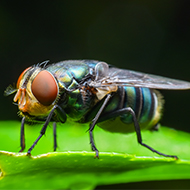Blowfly risk 'severe' across much of UK

Blowfly stirke is primarily caused by the green bottle fly, Lucilia sericata.
Risk levels for blowfly are “Severe” across much of the UK, according to the latest update from the National Animal Disease Information Service (NADIS) and Elanco.
The real-time update shows that risk levels are severe throughout all of England, Northern Wales and much of Scotland. A 'severe' risk means that one in 100 sheep might be struck by the disease.
University of Bristol Professor Richard Wall said: “Warm, humid weather is perfect for blowflies and increases the survival of any maggots on the sheep. This time of year is the peak of the strike season, the risk of strike is severe across most of the country.
“Fly populations are at their maximum, any lambs still on the farm are at high risk, and the risk for ewes is increasing as their fleece regrows. High levels of vigilance are therefore required even if animals have been treated against strike'.
Estimated to affect more than 80 per cent of British farmers, blowfly strike is primarily caused by the common green bottle fly, Lucilia sericata. Research from 2015 suggests that blowfly stroke costs the UK sheep industry as estimated £2.2million per year.
Farmers are being urged to remain vigilant for clinical signs of the disease - including irritation, nibbling at the tail head, and increased swishing of tails - and report them through the NADIS website.



 The RCVS has announced a new version of its 1CPD mobile app, with enhanced features for veterinary surgeons and veterinary nurses to record their continuing professional development.
The RCVS has announced a new version of its 1CPD mobile app, with enhanced features for veterinary surgeons and veterinary nurses to record their continuing professional development.